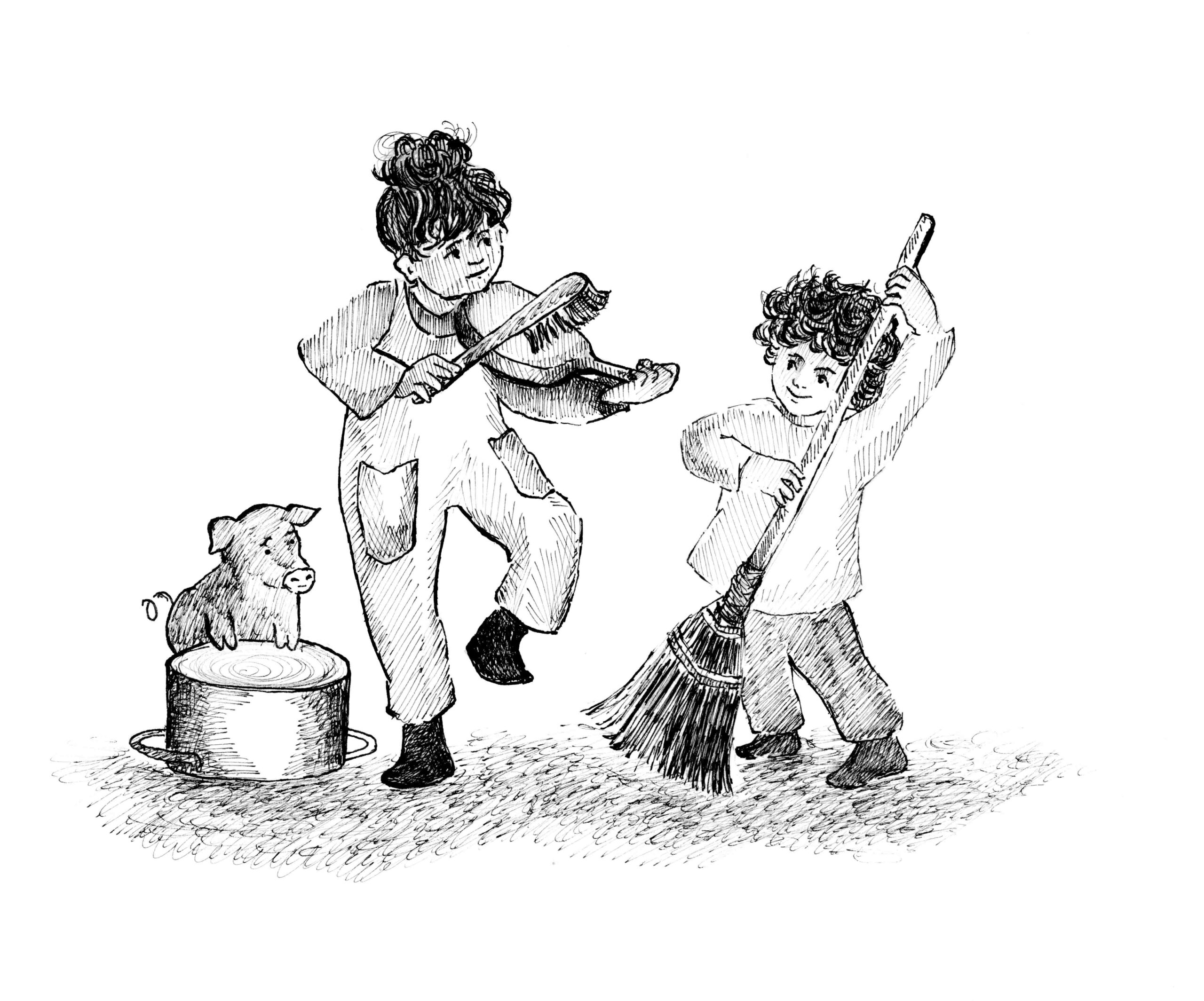As early as 100 years ago, progressive educators were concerned with allowing children to be children, not integrating them into the supposed necessities of adults. Thoughts on free play and religious tolerance in Waldorf Kindergartens.
When Emmi Pikler opened her pediatric practice in Budapest in the early 1930s and had her first child, Hungary’s politics were dominated by a right-wing government under Miklós Horthy, who passed anti-Semitic laws and brutally persecuted dissenters. It was in this context that Pikler began to elaborate her take on infant pedagogics. At its core is the idea that free initiative is the most important thing for child development: «It is essential that children discover as many things as possible on their own. If we help them solve all tasks, we deprive them of the very thing that is most important for their intellectual development.»1
At exactly the same time in Berlin, music educator Heinrich Jacoby developed revolutionary pedagogical approaches in a joint effort with movement therapist Elsa Gindler. The revolutionary aspect referred to the need for adults to change their behaviour in regard to education instead of constantly harassing children: «The mentality and behaviour of the teaching adults should change. Children’s development is disturbed by rules, inappropriate questions, and premature assistance; they lose the ability and courage to try things out for themselves, to improvise, and spontaneously allow their own expressions to arise, whether in the fields of music, movement, or linguistic expression.»2 Jacoby had to end his collaboration with Gindler in a rush and flee to Switzerland. He knew that otherwise, he would end up in a Nazi extermination camp, like all Jews and people who professed freedom.
When Maria Montessori gave a speech on Peace and Education to the League of Nations in Geneva in 1932, she emphasized that only an education oriented towards freedom and autonomy would lead to lasting peace,3 Fascism was also on the rise in Italy. From 1934 onwards, Mussolini turned against the institutions of his great contemporary, who tirelessly emphasized: «Children have an irresistible urge towards freedom. It is not like a vase being filled, but like a spring left to bubble.»4
Just like Montessori institutions in Italy, Waldorf schools in Germany were tolerated for a few years at this time before they too had to close. Rudolf Steiner had already set the revolutionary pedagogical tone in 1919: «The task then arises for us not to want to teach children all kinds of things using our will, but […] to exist in their environments in a way that the children can imitate the matter in question».5 Above all, the development of the young child is promoted through the self-education of the educator. The most important thing is to give them time and space for free play in an environment designed according to their needs.
Learning Programs, Tests, and Safety Regulations
Although renowned authors never tire of emphasizing that suppressing individual initiative permanently disrupts young children’s will to learn and develop, one can get the impression that many countries’ educational policies intend to finally reverse the educational revolution that began 100 years ago. Free play initiated by children themselves is neither suspect nor better: it is tolerated as a sympathetic-romantic phenomenon, but it is not given any significant role in pre-school education. Today, it is not totalitarian regimes that ban institutions from implementing this basic pedagogical idea. It is concerned parents and officials in education ministries who think that children have no chance in the job market if they do not spend their time in preschool from the age of three onwards focusing on learning steps programmed and controlled by adults. In France, the book by the Canadian educationalist Catherine L’Ecuyer ‹L’émerveillement et la curiosité naturelle de nos enfants› (The Wonder and Natural Curiosity of our Children) is a bestseller – at the same time, compulsory education from the age of three is introduced and the legal status of kindergartens is abolished. Yet the book, which has also sold well in Spain, the UK, and the USA, states: «When we overwhelm young children with external stimuli, we paralyze their innate capacity for amazement and stifle their self-motivation.»6 In the UK, learning programs, tests and safety regulations make free play in preschools largely impossible. At the same time, the well-known journalist Sue Palmer publishes on her website: «Research connects starting school prematurely to long term mental health damage›.7
Space For Amazement
For decades, Waldorf Kindergartens around the world have provided a natural, artistically engaging environment that encourages self-guided activity, amazement, and learning – ideal for free play. Here and there, however, one can hear and read concerned voices objecting that freedom of thought is not guaranteed in these institutions because Rudolf Steiner is known to have had a spiritual worldview, which is transmitted to children in a roundabout way via educators.8 Even if one points out that Steiner repeatedly emphasized that Waldorf institutions should in no way teach religion or a particular worldview, nor Anthroposophy as described by Steiner,9 this concern remains for some since spirituality and religion have been associated with strict rules and with ideas represented as dogmas for centuries. If you obeyed the rules and believed in the dogmas, you belonged to a certain group; if not, you were excluded.
But anyone who reads Steiner’s work more closely can find that he thinks similarly about ideologies as he does about the role of initiative in education: just as children under six develop best through initiative and free play, so too does every adult in relation to spirituality and worldview issues. Constraint, rules, codes of conduct, and dogmas are yesterday’s world; an open and free-spirited atmosphere invites experimentation, exploration, and amazement and encourages development – in adults and children alike. Whether children have a huge urge to move and are constantly running, jumping, and wrestling, or whether they are contemplative, constantly asking questions, or building huts, there is space and time for their initiatives in Waldorf kindergartens. Whether parents are Muslim, Jewish, Christian, atheist, interested in yoga or basketball, at Waldorf Kindergartens, teachers strive to work with all parents to create a suitable environment for the children’s free play. Education towards freedom and tolerance are among the most important ideals of the Waldorf Kindergarten – and of Anthroposophy: «It is a question of trying to break free from dogmas precisely because human beings are becoming more and more individual and individualistic. In our time, more and more tolerance must arise, especially with regard to thoughts of religious life.»
Illustration by Ella Lapointe
Footnotes
- https://erzieherauge.blogspot.com/p/zitate.html.
- https://de.wikipedia.org/wiki/Heinrich_Jacoby.
- «If children are subjected to oppression and constraint during this precious and tender period of their lives, the seeds of their future life will be unfruitful and it will not be possible for them later, as adults, to accomplish the great tasks which life imposes upon them.» Quoted in French at http://journaldecole.canalblog.com/archives/2014/11/10/30931216.
- M. Deny, A.-C. Pigache, Le grand guide des pédagogies alternatives. Eyrolles, Paris 2017.
- Rudolf Steiner, Soul Economy. Body, Soul and Spirit in Waldorf Education 7th lecture, GA 303, Dornach 1987.
- Catherine L’Ecuyer’s website in English: https://catherinelecuyer-eng.com/thewonderapproach/ In Spanish: https://catherinelecuyer.com/2016/07/06/la-importancia-de-educar-en-el-asombro-y-en-la-realidad/.
- https://www.upstart.scot/research-connects-too-early-school-start-to-long%c2%adterm-damage-to-mental-health.
- For example, in the French magazine ‹Le Point›: https://www.lepoint.fr/societe/je-suis-la-cible-d-un- harcelement-des-pro-ecoles-steiner-02-10-2019-2338941_23.php#xtmc=steiner&xtnp=1&xtcr=1.
- “These general human qualities […] must be particularly expressed in the principle of Waldorf schools in that a Waldorf school does not convey religious or philosophical convictions or a particular worldview in any way. […] It was necessary […] to work towards the fact that Waldorf Schools are far from […] becoming, for instance, an Anthroposophical school.” Rudolf Steiner, Education, and Modern Spiritual Life. Lecture on the 15th of August 1923, GA 307, Dornach 1986.






One Comment